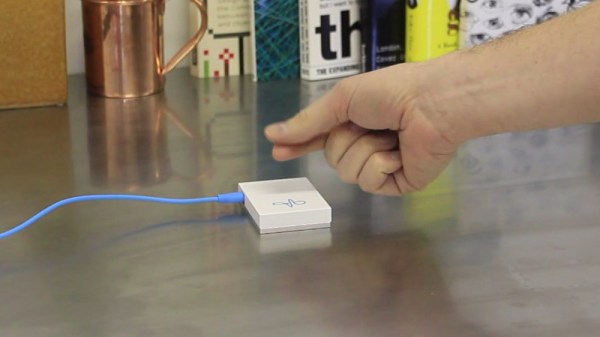The folks at [Design I/O] have come up with a way for you to play the world’s tiniest violin by rubbing your fingers together and actually have it play a violin sound. For those who don’t know, when you want to express mock sympathy for someone’s complaints you can rub your thumb and index finger together and say “You hear that? It’s the world’s smallest violin and it’s playing just for you”, except that now they can actually hear the violin, while your gestures control the volume and playback.
[Design I/O] combined a few technologies to accomplish this. The first is Google’s Project Soli, a tiny radar on a chip. Project Soli’s goal is to do away with physical controls by using a miniature radar for doing touchless gesture interactions. Sliding your thumb across the side of your outstretched index finger, for example, can be interpreted as moving a slider to change the numerical value of something, perhaps turning up the air conditioner in your car. Check out Google’s cool demo video of their radar and gestures below.
Project Soli’s radar is the input side for this other intriguing technology: the Wekinator, a free open source machine learning software intended for artists and musicians. The examples on their website paint an exciting picture. You give Wekinator inputs and outputs and then tell it to train its model.
The output side in this case is violin music. The input is whatever the radar detects. Wekinator does the heavy lifting for you, just give it input like radar monitored finger movements, and it’ll learn your chosen gestures and perform the appropriately trained output.
[Design I/O] is likely doing more than just using Wekinator’s front end as they’re also using openFrameworks, an open source C++ toolkit. Also interesting with Wekinator is their use of the Open Sound Control (OSC) protocol for communicating over the network to get its inputs and outputs. You can see [Design I/O]’s end result demonstrated in the video below.
Continue reading “World’s Tiniest Violin Uses Radar And Machine Learning”











